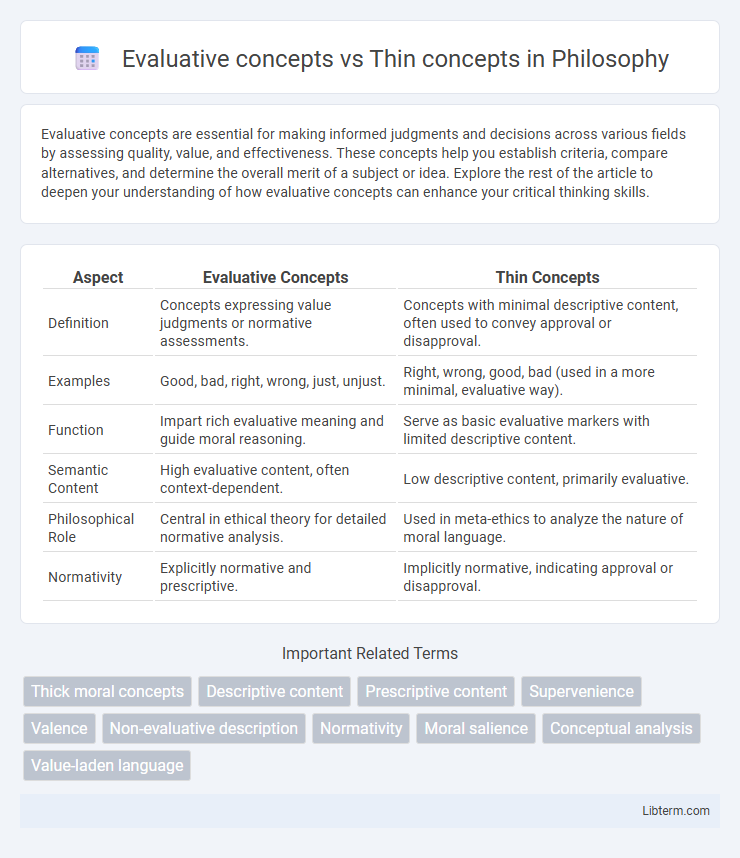Evaluative concepts are essential for making informed judgments and decisions across various fields by assessing quality, value, and effectiveness. These concepts help you establish criteria, compare alternatives, and determine the overall merit of a subject or idea. Explore the rest of the article to deepen your understanding of how evaluative concepts can enhance your critical thinking skills.
Table of Comparison
| Aspect | Evaluative Concepts | Thin Concepts |
|---|---|---|
| Definition | Concepts expressing value judgments or normative assessments. | Concepts with minimal descriptive content, often used to convey approval or disapproval. |
| Examples | Good, bad, right, wrong, just, unjust. | Right, wrong, good, bad (used in a more minimal, evaluative way). |
| Function | Impart rich evaluative meaning and guide moral reasoning. | Serve as basic evaluative markers with limited descriptive content. |
| Semantic Content | High evaluative content, often context-dependent. | Low descriptive content, primarily evaluative. |
| Philosophical Role | Central in ethical theory for detailed normative analysis. | Used in meta-ethics to analyze the nature of moral language. |
| Normativity | Explicitly normative and prescriptive. | Implicitly normative, indicating approval or disapproval. |
Introduction to Evaluative and Thin Concepts
Evaluative concepts express approval or disapproval, reflecting value judgments such as "good" or "bad," and are often context-dependent and subjective. Thin concepts, by contrast, combine descriptive and evaluative elements but remain relatively simple and less emotionally charged, examples being "cruel" or "just." Understanding the distinction is crucial in philosophy and ethics, as it helps clarify how language conveys moral evaluation and descriptive content simultaneously.
Defining Evaluative Concepts
Evaluative concepts are characterized by their inherent normative content, expressing approval or disapproval and guiding moral or aesthetic judgments. Unlike thin concepts, which are primarily descriptive and lack explicit evaluative content, evaluative concepts integrate both descriptive and prescriptive elements, making them essential in ethical theory and practical reasoning. Defining evaluative concepts involves identifying their dual role in conveying factual information alongside evaluative attitudes that influence decision-making and social behavior.
Understanding Thin Concepts
Thin concepts refer to evaluative terms that express simple positive or negative judgments without detailed content, such as "good" or "bad." Understanding thin concepts involves recognizing their role as foundational evaluative building blocks that guide moral reasoning and judgment. These concepts contrast with thick concepts, which combine descriptive and evaluative dimensions, providing richer contextual meaning.
Key Differences Between Evaluative and Thin Concepts
Evaluative concepts involve normative judgments and express approval or disapproval, such as "good," "just," or "wrong," influencing moral and ethical reasoning. Thin concepts, by contrast, are simpler, combining both descriptive and evaluative elements but with less richness, such as "cruel" or "kind," serving as easily applicable labels in everyday language. The key difference lies in the depth of normative content: evaluative concepts carry significant moral weight, while thin concepts provide more immediate yet less complex evaluative content.
Historical Perspectives on Evaluative vs. Thin Concepts
Historical perspectives on evaluative versus thin concepts trace their roots to early modern philosophy, where thin concepts like "true" or "good" were often treated as minimal evaluative terms with limited descriptive content. Philosophers such as G.E. Moore challenged this by highlighting that evaluative concepts carry richer normative significance beyond mere descriptive function, distinguishing them from thin concepts. This distinction has evolved through analytic philosophy, emphasizing the role of evaluative concepts in moral discourse and metaethics compared to the more neutral, often descriptive use of thin concepts in language analysis.
Roles of Evaluative and Thin Concepts in Ethics
Evaluative concepts, such as justice and virtue, play a crucial role in ethics by guiding moral judgments and shaping normative standards through rich evaluative content. Thin concepts like good and bad function as fundamental evaluative expressions that provide basic moral assessments without detailed content. Together, evaluative and thin concepts form a framework for ethical reasoning, where thin concepts offer general evaluative direction and evaluative concepts provide more specific guidance on moral values and principles.
Philosophical Debates on Thin vs. Evaluative Concepts
Philosophical debates on thin versus evaluative concepts center on their distinct roles in moral reasoning and language. Thin concepts, such as "good" or "bad," possess a minimal descriptive content with an inherent evaluative aspect, while evaluative concepts carry richer, more complex normative information. Scholars examine whether thin concepts can function independently in ethical discourse or require contextual support from broader evaluative frameworks.
Examples of Evaluative and Thin Concepts in Practice
Evaluative concepts like "justice" and "honesty" involve value judgments that assess the goodness or badness of actions or character, often guiding ethical decision-making and moral reasoning. Thin concepts such as "good" and "bad" provide basic evaluative assessments that are contextually flexible and less detailed, commonly used to express general approval or disapproval. In practice, evaluative concepts appear in discussions about fairness in law and integrity in business, while thin concepts surface in everyday language to quickly convey positive or negative reactions without specifying underlying virtues or vices.
Implications for Moral Reasoning and Decision-Making
Evaluative concepts such as justice or virtue carry rich, context-dependent meanings that guide moral reasoning by integrating emotional and cultural values, shaping nuanced ethical judgments. Thin concepts like good or bad provide basic evaluative judgments that function as cognitive shortcuts, enabling quick moral decisions but potentially oversimplifying complex situations. The interplay between these concepts influences decision-making processes, where reliance on thin concepts may lead to rigid outcomes, while evaluative concepts promote deeper reflection and adaptive ethical responses.
Conclusion: The Importance of Distinguishing Evaluative and Thin Concepts
Distinguishing evaluative concepts from thin concepts is crucial for precise philosophical analysis, as evaluative concepts inherently carry normative judgments while thin concepts primarily describe qualities without substantial normative content. This differentiation enhances clarity in ethical debates, enabling more accurate evaluation of moral arguments and value-based assessments. Recognizing their distinct roles prevents conceptual confusion, fostering deeper understanding in both normative ethics and descriptive philosophy.
Evaluative concepts Infographic

 libterm.com
libterm.com